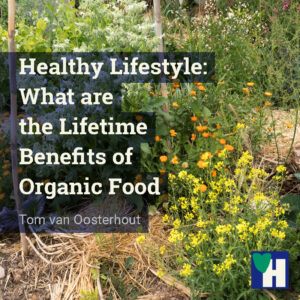
The benefits of organic food are numerous. We buy and eat organic food, because it’s better for our environment, for biodiversity, for our food supply, for our health, and for farmers as well. How to explain all these advantages?
For us, to buy organic food is a way to contribute to a better world. With this in mind, we have no problem with the extra price we pay for organic food. It’s an investment that pays off immediately.
Organic food is in fact cheap because we hardly spend money on doctors or medication. We also enjoy investing in the devotion and enthusiasm of the organic farmers and shopkeepers we know. We admire their craftsmanship and their courage for going against the conventional farmers and food industry.
Some of the links are affiliate links. As an affiliate associate, we earn a commission when you purchase any of the products offered through the shared links at no extra cost for you. This helps us maintain this website.
Table of contents
- 1 The benefits of organic food
- 2 Organic food is healthy
- 3 Benefits of organic food for the biodiversity
- 4 The benefits of organic food for animals
- 5 The benefits of farming organic food
- 6 It’s the ideology, stupid
- 7 The Migratory Flying Geese
- 8 Neonics
- 9 The world upside down
- 10 Align the benefits of organic food with international policies
The benefits of organic food
The benefits of organic food are numerous. It is super healthy, cheap compared to conventional food, and contributes enormously to biodiversity. Buying organic food is one of the more specific and direct contributions we as consumers can make to a more sustainable planet.
Organic food is healthy
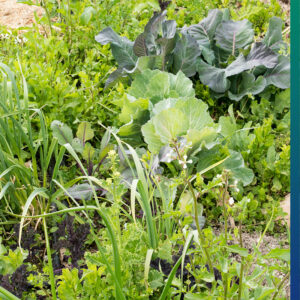
Although the trial was small – only 16 participants and a total of 158 urine samples – the outcome was amazing. An organic diet intervention resulted in a reduction of urinary pesticide levels of 60 to 95% in children and adults. Depending on the type of pesticide.
More evidence of the adverse effects of conventionally produced food comes from research into the effects on endocrine secretion. Organophosphate pesticides have been identified for cognitive deficits and attention-deficit disorder in children following prenatal exposure. More specifically pesticides disrupt the production and functions of estrogen.
Related: What is Sustainability in Food and How Can we Achieve it?
Benefits of organic food for the biodiversity
Conventional farming kills bees (among a lot of other insects and other animals that live in the wild). A recently published study (October 2020) explains how this works. Agricultural chemicals end up in floral nectar and pollen causing bee mortality. There is also an indirect, damaging effect on bee health via the influence of these chemicals on the habitat of bees.
Numerous studies support the positive impact of organic farming on the environment. Resulting in greater biodiversity, higher soil organic matter, lower nitrates emissions and lower energy use than conventional farming.
The benefits of organic food for animals
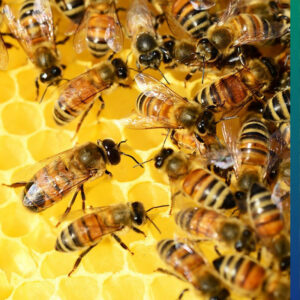
Organic farmers invest a lot in husbandry. Animals have far more space than in conventional farming. Usually, the animals are allowed to roam freely. They eat organic feedstuff which suits them best without all kinds of supplements.
We significantly reduced our intake of meat because of the direct relationship between the consumption of meat and the disappearance of rainforests, such as the Amazon. We are not 100% vegetarians or vegans. Once a week we eat chicken, turkey or fish. Only in relatively small quantities. Preferably organic. This is easier said than done. In the supermarket, you can buy as much chicken, turkey and fish as you want. Organic chicken and turkey you always have to order.
We have no idea where to buy organic fish. If there exists any. That’s a pity because fish has a lot of health advantages, such as the fatty acid Omega 3. It’s also better digestible. Most fish you can buy here in Spain comes from fish farms. Fish is already suspicious because of the contaminated seawater. Specifically close to the coast. Fish in fish farms is even more suspicious because these fish are fed with non-organic feedstuff.
The benefits of farming organic food
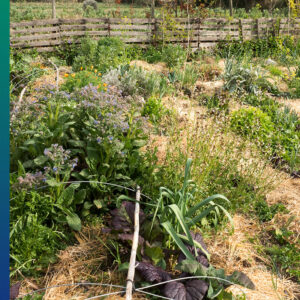
One of the disadvantages of organic food production is that the yield on organic farms can be significantly lower. At this moment, organic yields are estimated at 40% to 85% less compared to yields in conventional farming.
There has always been much debate about the capacity of organic farming to feed the world population. There are good reasons for this debate. The population in Asia, Africa and Middle and South America still grows. This year the world population is estimated at 7,8 billion. The prognosis is that it will rise to almost 10 billion in 2050. Although future estimates for the year 2100 differ significantly from 7.3 to 15.6 billion.
There are several ways to pick up on both challenges. The first is to eat less meat. The second is to cut back on food waste, which last year for the first time in the USA passed the sad limit of 50%. The third option is to support organic farming with the number of scientific budgets that are now invested in conventional farming.
This is also necessary because organic farming requires more experience, knowledge and management capacities. The challenge to farm organic is, from the perspective of craftsmanship, exceptionally high. Only the best farmers can go organic. The question is: why don’t they?
It’s the ideology, stupid
In 2004 a survey among conventional dairy farmers was organized in a Dutch province to find out whether these farmers were susceptible to conversion to organic farming. Practically they would be able to transform to organic from one day to the other. No complicated changes were required.
Of course, the farmers are not allowed to use pesticides, fungicides, herbicides, and artificial fertilizers. Unfortunately, the survey showed, none of the farmers even considered changing to organic. They had only one reason: they associated organic farming with a liberal and anti-business attitude.
The farmer’s attitude is paradoxical because it goes against their core argument to refuse to convert: organic is liberal and anti-business. Premiums on producer prices for organic products reach up to 150% in addition to conventional prices. However, no discussion was possible. Organic went totally against their, predominantly religiously inspired, beliefs.
Related: Nutritional Guidelines with a Sustainable Focus
The Migratory Flying Geese
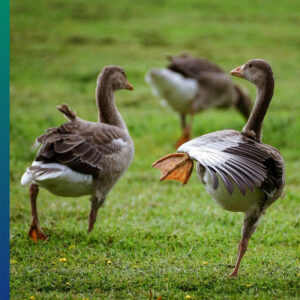
Another example to explain the downside of conventional farming is the attitude of conventional farmers when it comes to their relationship with nature. During farmer protests in The Netherlands against stricter policies on nitrogen dioxide and methane one of them explained what people should do when they want to enjoy nature: “Go and live abroad. There they have a lot of nature.”
In The Netherlands, the government manages nature. The government assigns the types of nature and sets specific targets for these types. Types of nature that do not comply with government policies are curtailed. I agree, this is absurd. It gets even more absurd.
Every year, in the Dutch province of Friesland, the government indiscriminately compensated farmers for migratory geese, ravaging their pastures. This was supposed to change when the government started to manage nature.
Of course, nature has its own policies. How to compensate farmers when only the geese know which pastures they will visit? In the end, nothing changed and every farmer still receives his yearly compensation, geese or not.
Neonics
Most absurd of course are the policies of the French government to approve the intoxication of sugar beet seeds with one of the most dangerous pesticides: neonics (short for neonicotinoides). France is the second-largest food exporter in the world, so the stakes are very high. However, they don’t give a toss about your health.
The only reason the French government approves such intoxication is that they do not want to give up on the lucrative production of sugar. Yes, you are right, that is the same sugar that causes all the obesity and rotten teeth. Moreover, sugar production is not lucrative because the market price is high. On the contrary. The production of sugar is lucrative because of the subsidies of the European Union.
The world upside down
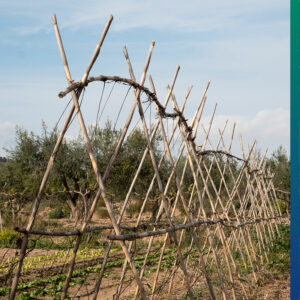
Given all the positive aspects of organic food, it is incredible that conventional food can be produced without any type of certification.
Moreover, conventional farmers do not comply with EU rules regarding the use of pesticides, fungicides and herbicides. They consistently use too much and types of poison that are not allowed.
In contrast with conventional food, organic food can only be called organic when all the rules are strictly observed. There is a worldwide monitoring system and bureaucratic oversight. One mishap and an organic farmer loses his or her license.
This is the world upside down. We compare conventionally produced food with tobacco products. That’s why we favour licensing such food. In all shops and supermarkets where they sell conventional food, also in bars and restaurants, this food has to come with the following warnings: this product harms the environment, biodiversity, and unborn life, and this product has long-term detrimental effects on your health.
Align the benefits of organic food with international policies

Don’t get us wrong. We are great advocates of a united Europe. Preferably a federal one. The sooner the better. However, we want a Europe that supports ecological farming, not conventional farming as is the case at the moment.
Not just in Europe, but all around the world. For us, to restrict the use of pesticides, fungicides and herbicides in Europe, only makes sense when imported foods and animal feedstuff apply to the same restrictions.
Will you share your thoughts on organic and conventional farming? Put them in the comment box.


Hi Tom,
My first choice is organic too. I love everything about organic and try to support local farmers who grow only organic and natural products.
Your article is very informative. I was quite surprised reading about France, that they don’t want to give up on the lucrative production of sugar. Because they love their food, I thought they would care and choose wisely what products to put into the market.
But as you said the world is upside down. The only choice we have to continue telling the truth.
I think the world is waking up slowly. More and more people are choosing organic vs non organic with chemical pesticides, but there is a long way to go.
Do you think the world is waking up to the truth about food?
Have a good day?
Hal
Hi Hal,
Thank you for your compliments.
It’s hard to say whether the world is waking up to the truth about food. First of all this truth is complicated. Although people don’t shy away from complex issues per se, they do tend to put the responsibility for food in the hands of the government. Perhaps that is one of the more implicit messages in my article: we have a responsibility too.
Second is that there is still not much consistency in epidemiological research in the effects of our food and agriculture. Foraging for such information is a time consuming effort.
Because there is not any insight in how long the way is we have to go, it’s also unclear what strategy any agricultural change has to follow. This makes consumers uncertain.
Although I’m full of positive hope for the future of our food, a more urgent approach would be me more appropriate in my view.
Have a nice day,
Tom
Hi Tom,
I feel slightly embarrassed – you would think that with my “healthy lifestyle” in terms of lots of exercise and a well-balanced, nutritious diet, I would perhaps eat a lot more organic produce.
But alas, it’s not something I overly concern myself with.
With that said, I will often choose organic fresh vegetables to eat, but once again this is only occasionally, rather than a regular habit.
I think in all honesty I’ve never had the benefits of organic food explained to me in this way.
I’m ashamed to say that for many years I wrongly assumed “organic” simply meant growing something in a special type of soil (I’m not even going to try and explain where I thought an organic chicken came from, LOL).
I was amazed by the statistics in relation to population growth, and appalled by the figures on food waste.
Once again though, this is typically something I have taken for granted, but it’s starting to make a lot more sense now.
Just as a matter of curiosity (plus I know you guys are well-travelled), but do you typically purchase your produce from farmer’s markets and the like, or do you find suitable ingredients in your local supermarket?
To be honest, irrespective of how I feel about my own sad rejection of “organic” I’m afraid to say that the opinion given by the conventional farmer during the farmer protests in The Netherlands (“Go and live abroad. There they have a lot of nature.”) is probably one that is shared by many of his “conventional” colleagues.
A great read as always Tom and very thought-provoking. You may have an organic-convert on your hands.
Partha
Hi Partha,
Don’t worry, organic chickens also come from eggs, which are the result of the mating of a hen and a rooster. You know how you can recognize the difference between a ‘conventional’ and an organic chicken? When you fry or cook them the ‘conventional’ chicken will shrink with about a third of its size.
In answer to your question about where we buy our organic produce, a friend of ours has an organic shop in a small village here on the coast and brings his produce every fortnight to where we live. Which is very convenient now we’re not allowed to leave our village. Every other week we buy organic produce from a small organic shop in the village where we live. There is also a supermarket which has some organic produce. And in another village some 10 kilometers from here there is also a small organic shop.
Thank you again for your compliments and we’re very proud to have you as an organic-convert on our hands. Keep up the good work.
Regards,
Tom
Thanks for sharing an extremely informative article on the benefits of organic food. I have very little knowledge on this topic, but I’m glad to read this post. It’s rather sad how much food we waste every year and in contrast, we think that it’s cheaper to buy wholesale food. Organic food might the more expensive, but if you buy only what you need, you’ll surely get a better deal.
And when I think about how much good we can do to our planet by buying from and supporting organic food producers, it makes me wonder even more. Thanks for sharing this post. I’ll definitely start buying more organic food. Keep up the good work!
Hi Ivan,
Thank you for your compliments.
Just today I discussed with a friend of mine, who follows European politics very closely in Brussels, where he lives, about an article he wrote on the new EU Common Agricultural Policy (CAP).
He was only focussed on the debate why a certain commissioner was publicly citing doubts about the CAP. This commissioner was quickly set straight by Von der Leyen, the chair of the EU Commission. My friend’s point was to demonstrate how Germany, through Von der Leyen, tries to get more grip on European policies. Not a word whether the doubts were justified.
And the doubts about the new CAP are justified, because the new CAP hardly changes anything in European Agricultural policies. For the next 25 years everything will remain as it has been for the past fifty years.
This is why it is so important that we as consumers make it an issue to show what we think of such policies and should buy more and more organic.
Glad to see you’ll join us. Thanks also for that.
Have a nice day,
Tom
Hey,
This article has been a real eye opener for me. Since we have been in lockdown this year, and now a second wave here in the UK, my diet has not been the best. I used to be very strict with my diet and I learned that it is because I went to work, and I was surrounded by shops that served healthy food. Now that I am working at home, I have dropped my discipline and I am so disappointed in myself.
Organic food certainly is a lot healthier and has so many more benefits for us. So, I have made the decision to eat a lot healthier and especially organic foods. I actually enjoy organic foods so it is a no-brainer for me.
I will let you know how I go with my diet changing and if I have any questions then I will get in touch.
Thank you for sharing and keep up the great work.
All the best,
Tom
Hi Tom,
Thank you for your comments.
Yes, the current situation is not very supportive for a healthy lifestyle. It’s not just the comfort food, but also the lack of exercise. Outdoor exercise.
The relation between organic food and health is not very straightforward. When you eat organic, you miss out on pesticides, fungicides and herbicides. That’s good for everybody, but on the long run.
For the short run, and for instance looking at cholesterol levels, organic chips, cookies and chocolate can, if consumed in too large quantities, hamper your health as much as the conventional versions.
On the other hand, the positive effects of organic food production on biodiversity, is immediate. The effects of sufficient biodiversity on our health can also only be detected on the long run.
Roughly speaking, fresh fruits and vegetables are usually healthier than meat and prepared food. If organic, fruits and vegetables also come with the mentioned short term and long term advantages.
Glad you decided to buy more organic and do indeed keep us posted about your progress and, of course, any questions are welcome.
Regards,
Tom
The problem with the bee population is quite serious for the last couple of years. Personally, I am trying to support the market with organic food, I am almost vegetarian, etc. But do you think more people will go this way? Usually, when I talk to friends about the difference between purchasing the chicken from the supermarket and butcher or farm shop, the answers are usually: ‘I don’t have money for that.’ I think it’s similar when it comes to organic food. For me, it feels like people are quite aware but due to the financial situation, they don’t take any action.
Hi OlaBee,
A couple of months ago I saw a picture from an apple orchard in China. People were standing on the top of ladders which were situated against the trees. Every one of them carried a small brush in their hands to pollinate the flower of the trees. This was necessary because the bees had all been destroyed by pesticides. That, of course, is a very sad situation. The costs of pollinating by hand are enormous.
This brings me to the issue of the costs of organic food. When you only compare the price you pay for an organic or a conventional apple, yes, the difference is substantial. This difference is caused by several very unfair practices.
The first is that organic food must be certified to be called organic. The bureaucratic costs of certification are substantial for farmers, the food processing industry and the shops. Conventional foods do not come with bureaucratic costs.
The second is that according to the certification rules organic food can not be processed in the same industry as conventional food. Given the limited amounts of organic foods processed, the costs are higher relative to the large scale production facilities of conventional foods.
The third is that the real costs of conventional farming, the decline in biodiversity, the decline of healthy soil, and the air and water pollution, are served to future generations.
There is a way to keep the costs of organic food at a minimum without depriving yourself of what you need.
Try not to eat too much and don’t throw away food. 100-150 grams of organic meat once a week is enough for most people. Combined with the same amount of organic fish once a week, is more than enough. Unless you have to carry bricks all day on a building site.
The rest of your diet should consist of a well balanced amount of fruits and vegetables. Limit the amount of eggs to 1 or 2 a month. Don’t use salt and limit the consumption of milk and cheese. Don’t eat more than twice a day. Vary every day what you eat. Eat according the seasons.
Avoid bread, potatoes, pastas and rice. Or at least, limit the amount of these to once a week and don’t mix them with fish, meat of eggs.
If you keep this up for a couple of months, you will notice that you don’t spend more money on your food when you consistently buy organic and that you will feel yourself much better.
Good luck with your work.
Regards,
Tom